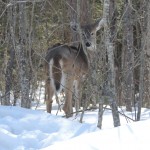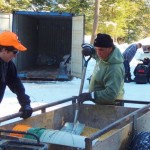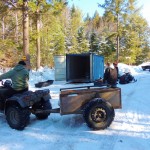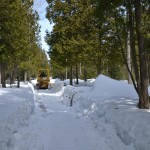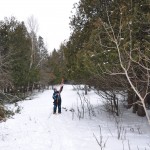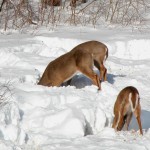DeerSave
The OFAH DeerSave Fund was established in 1995 to help members, clubs and partners deliver emergency winter deer conservation programs across the province. Volunteers get involved by cutting down browse, breaking trails and providing emergency feed for deer during severe winters. The OFAH DeerSave Action Plan and fund applications are available by contacting Keith Munro, OFAH wildlife biologist by email keith_munro@ofah.org.
- harsh winter conditions
- emergency deer feed
- DeerSave volunteers
- trail breaking
- cutting down cedar browse
- finding the feed
Thank you to Deer Save Manitoulin, Paula Newton and Al Last for the above DeerSave photos
Winter Deer Feeding – A Question of When
White-tailed deer have evolved to tolerate periods of snow and cold temperatures, partly by changing their behavior. Combined with good winter habitat, this behavioral adaptation allow deer to survive well in most winter conditions. However, harsh winters characterized by deep, crusty snow and extended periods of cold can result in significant winter mortality of deer.
- The OFAH promotes and supports the emergency feeding of deer that follows scientifically-sound standards, only when and where winter severity data predicts a high probability of die-off.
- The OFAH does not support the annual supplementary feeding of deer because of habitat and conservation reasons. However, we recognize that supplementary feeding is widespread in Ontario.
Emergency feeding involves providing artificial feed during severe winter conditions because natural food is not available (i.e. not present or inaccessible). Emergencies generally occur only at the end of an exceptionally long, severe winter.
Supplementary feeding is providing artificial food to deer during the winter to supplement natural foods during normal winters outside of winter emergencies.
MNRF guidelines for winter feeding
Standards & guidelines for measurement of snow and winter severity in Ontario

